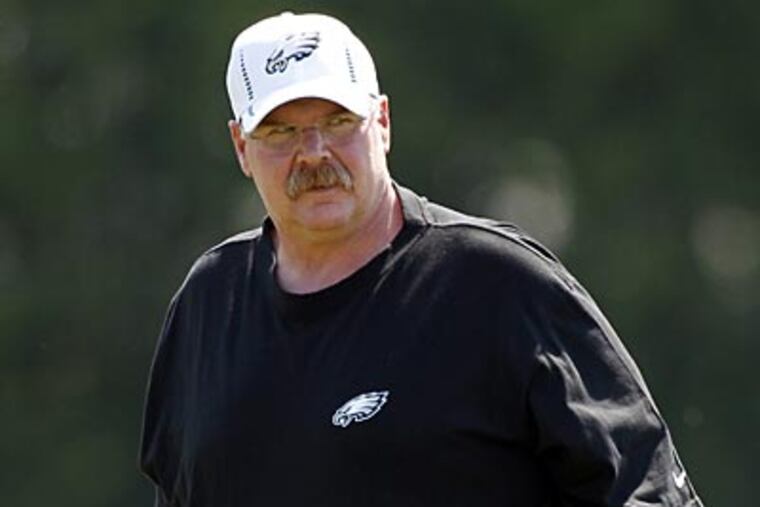Eagles haven't significantly altered their approach to business, despite perceptions
The dynamic may have shifted slightly, some tinkering may have been done, but the Eagles still conduct business as they always have.

The dynamic may have shifted slightly, some tinkering may have been done, but the Eagles still conduct business as they always have.
And yet, the narrative, after what unanimously has been declared a successful offseason, has been that the Eagles have significantly altered their philosophy or shaken up the front office after a disastrous 2011.
Not true.
They have made changes. However, they are micro adjustments that owner Jeffrey Lurie hopes will have a net macro result - the Eagles finally winning a Super Bowl.
Most of the changes within the front office have centered on public relations and can be summed up as such: Andy Reid has been more accommodating, Howie Roseman has been nudged into the spotlight, and Joe Banner has taken a step back behind the curtain.
Fair or not, the Eagles have suffered from a public relations standpoint, with the sometimes-gruff Reid and the polarizing Banner as their front men. Lurie has had a few open-mouth-insert-foot moments himself.
But the Eagles, for the most part, kept winning, stayed the hottest game in town, and everything was status quo.
And then the "Dream Team" happened.
Vince Young will go down in infamy for his utterly absent-minded utterance, but he wasn't the only one who got caught up in the Eagles' post-lockout blitz through free agency last summer. Banner granted interviews and after one particular signing announced that the Eagles were "all-in" for 2011.
Ready. Aim. Fire.
The Eagles president hasn't spoken publicly about the team since last preseason.
Reid and Roseman, meanwhile, have been front and center after a series of popular moves were made this offseason - extensions for LeSean McCoy, Trent Cole, and Todd Herremans, new contracts for free agents DeSean Jackson and Evan Mathis, a trade for linebacker DeMeco Ryans, and a strong draft on paper.
The Eagles once again are the darlings of the media, but Reid and Roseman have been careful not to make any bold statements about the coming season. They're receiving the bulk of credit for the offseason, but attribution can sometimes be a double-edged sword.
That doesn't mean Banner doesn't have his fingerprints on this roster. He's always been an Oz-like figure, but his public perception problem - sometimes of his own doing, often not - has him now more behind the scenes.
Several requests to interview Banner this offseason have been declined.
He's certainly taken a step back as the lead contract negotiator, handing over more responsibility to his protege Roseman. It's actually been an ongoing process as Roseman has matured as a general manager.
The 36-year-old is now in his third season as GM and is simply being given more to do, unlike his predecessor Tom Heckert, who escaped from Reid's shadow.
Roseman's increased role does not mean Banner is going anywhere. He and Lurie, childhood friends, built the Eagles into a fiscal success story. Banner's mastery of the salary cap continues to pay dividends as the Eagles retain their own talent and sign whichever free agents they want.
That's been the blueprint for years. Last year's free- agent frenzy wasn't the first time the Eagles spent freely. This year's taking care of their own wasn't the first time they rewarded their best loyal charges.
But attention spans are short, and stories must be written. The latest, propagated by Drew Rosenhaus, is that Reid played a central part in the McCoy negotiations.
Forget for a moment that the agent stands to benefit from the perception that he has the player-friendly coach's ear. Reid has always been a part of negotiations in that he ultimately decides which players stay or go, and which ones he really wants to stay or go.
He obviously wanted McCoy to stay. So Reid once again assumed his role as good cop. Banner played the bad cop for years, often to his own detriment, as long as it meant getting fair market value.
Roseman has a softer touch, which may have assisted in getting the three Rosenhaus clients - Jackson and Mathis were the others - signed without much tumult. But the roles remain the same, the business plan relatively unchanged.
Despite a report two months ago that suggested Reid had fought for more control, it's always been his show.
If the Eagles win a title this season there will be enough praise to go around. If they falter, Reid, naturally, will get the most blame. Roseman will get his share as well.
Lurie is staying the course but is banking on the subtle changes made in the front office. If they don't produce a winner he may have some tough choices to make. You can't put a happy face on that.